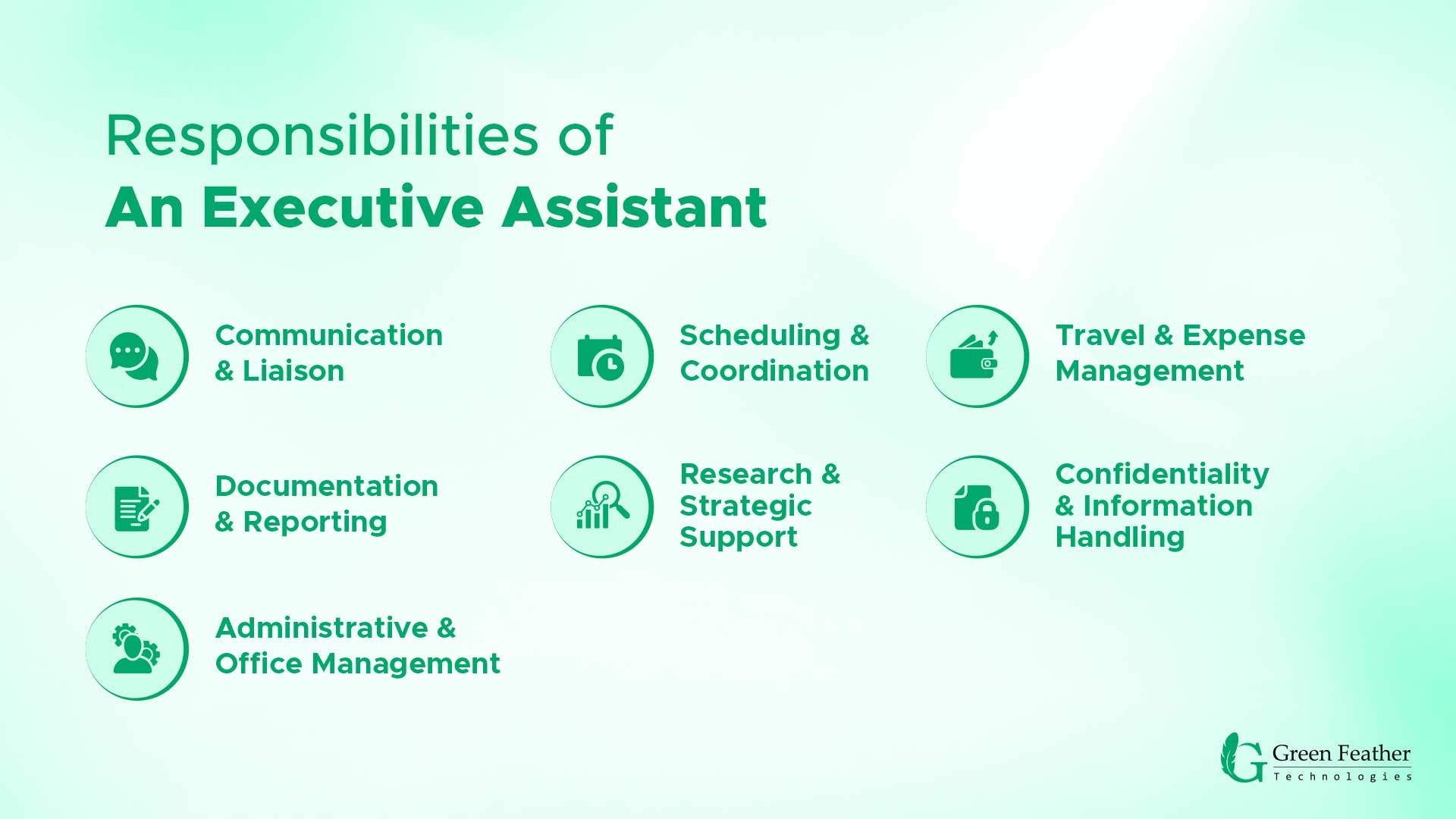Summary
An executive assistant serves as a strategic partner to support leadership in an organization. They do it through communication management, scheduling, travel coordination, documentation, research, and office administration.
Executive assistants aren’t just simple administrative support. They are strategic partners to leadership roles, helping with decision-making and streamlining operations.
According to a study, there are around 304,678 executive assistants working in the USA, and the number is only increasing. So, if you’re looking to hire an executive assistant, understanding their true value can help you find the right support to elevate your executive function.
And if you’re considering a career move, learning what does an executive assistant do could be your next smart step toward a future-proof profession.
What is an Executive Assistant?
In simple terms, an executive assistant is someone who assists a person in a leadership role. It can be a senior executive, a CEO, a director, or any other leadership position.
However, don’t think of them as a regular secretary or assistant. An executive assistant essentially serves as a partner in developing strategies. The goal of an EA is to help the executive operate at their peak efficiency.
A modern executive assistant is a trusted advisor to the executive with a deep understanding of the business. In fact, in some scenarios, you can represent your executive when necessary.
What Does an Executive Assistant Do?
An executive assistant has to wear multiple hats. They have to be someone who anticipates needs, solves problems, and makes strategic decisions. Let’s break down what does an executive assistant do –

1. Communication & Liaison
An executive assistant manages the flow of information to and from executives. They work as a gatekeeper and representative to do the following:
- Screening calls, emails, and meeting requests based on priority and relevance
- Crafting professional correspondence on behalf of executives
- Liaising between executives and internal departments, external clients, or partners
- Translating executive decisions into clear communications for team members
2. Scheduling & Coordination
Time management will be a core function that directly impacts executive productivity. They help the executive manager save time by helping them to –
- Managing complex, ever-changing calendars and resolving scheduling conflicts
- Organizing and preparing for meetings, including agendas, materials, and follow-ups
- Coordinating cross-departmental projects and initiatives
- Ensuring executives are ready for all engagements with appropriate briefings
3. Travel & Expense Management
Here, they will also have to handle logistics that keep executives mobile and focused on high-value activities. They can help them manage their travel and expenses more efficiently.
- Create comprehensive travel plans that include transportation, accommodations, and meetings.
- Manage travel documentation and address contingencies while executives are on the move.
- Process expense reports and maintain accurate financial records
- Optimize travel budgets while ensuring executive comfort and productivity
4. Documentation & Reporting
As the executive assistant, they will also be involved in information management and documentation. Some key responsibilities in this include –
- Take detailed meeting minutes and distribute action items
- Create and maintain presentation materials
- Draft reports, memos, and other business documents
- Organize and retrieve essential information quickly when needed
5. Research & Strategic Support
In the modern business landscape, an executive assistant is also involved in some strategic tasks. These tasks help your senior executive save time and effort in research and brainstorming.
- Conducting research for decision-making and strategic planning
- Analyzing data and preparing executive summaries
- Identifying potential issues before they become problems
- Contributing insights to business planning and operations
6. Confidentiality & Information Handling
An executive assistant is responsible for handling sensitive and confidential information on behalf of a business. This entails a range of additional responsibilities to hold the information correctly and maintain confidentiality. To do that, they have to –
- Manage confidential documents, communications, and data
- Exercise discretion regarding company strategy, personnel matters, and financial information
- Implement secure information management protocols
- Serve as a discreet sounding board for executives
7. Administrative & Office Management
Achieving operational efficiency is a fundamental responsibility in the executive assistant role. They still have to maintain the administrative and management tasks, such as –
- Oversee office operations and the administrative staff
- Manage supplies, equipment, and vendor relationships
- Implement and improve office procedures and systems
- Create a productive work environment for leadership teams
A Typical Day of an Executive Assistant Might Include
Well, now you got an idea of what an executive assistant does. But you still don’t know what a day in the life of an executive looks like? Here’s an inside look—
Morning Check-Ins
The work of an executive assistant starts very early with the morning check-ins. It’s their responsibility to ensure everything is ready and running smoothly for the executive. This can include –
- Reviewing incoming communications and flagging urgent matters
- Briefing executives on the day’s schedule and priorities
- Preparing materials for morning meetings
- Handling time-sensitive correspondence
Midday Follow-Ups
After the morning check-ins, they will need to do midday follow-ups with the executive. It’s crucial to keep them updated throughout the day on a variety of things by –
- Coordinating logistics for upcoming commitments
- Processing approvals and decisions from morning activities
- Addressing issues that arose during meetings
- Preparing executives for afternoon engagements
Afternoon Wrap-Ups and Planning for the Next Day
The day of an executive assistant will end around the afternoon when they wrap things up. But it’s not just about wrapping up the day. They also have to prepare for the next day. Here’s what they do:
- Confirm the next day’s schedule and make final adjustments
- Ensure all action items from the day are documented and assigned
- Prepare briefing materials for tomorrow’s commitments
- Resolve any outstanding issues before the executive departs
Where They Work
Liking how the executive assistant job pans out? Then you must be wondering where the ideal workplace could be. Any organization with a leadership team can benefit from having executive assistants. It may include –
- Corporate Settings: Supporting C-suite executives in established companies
- Startups: Providing versatile support to founders and small leadership teams
- Virtual or Remote Roles: Working as a virtual executive assistant across geographic boundaries
- Non-profits: Assisting executive directors and boards in mission-driven organizations
- Government: Supporting elected officials and agency leaders
How a Virtual Executive Assistant Can Help a C-Level Executive?
A virtual executive assistant of a C-Level executive can become his strategic support remotely from anywhere. They help to focus on the core business functions with their diverse skill set. Here’s how a C-Level executive can benefit from a virtual executive assistant over an in-house one –
- Cost-effective support
- Flexible scheduling
- Location independence
- Specialized expertise
- Reduced management burden
- Technology integration
How to Become an Executive Assistant?
If you’re drawn to this dynamic and rewarding career path, here’s how you can position yourself for success as an executive assistant.

Educational Requirements
You can enter the field with an associate’s degree or a high school diploma plus significant experience. However, higher education typically provides advantages for career advancement.
According to Zippia, about 60% of executive assistants have a bachelor’s degree. This means if you don’t have one, you will definitely fall behind in the competition.
A bachelor’s degree in business administration, communications, or a related field can definitely be a plus for your career advancement.
Training and Certifications
While it’s not a necessity, professional certifications can help you stand out from the crowd. They work as a testament to how committed you are to the field—
- Certified Administrative Professional (CAP) from the International Association of Administrative Professionals
- Microsoft Office Specialist certification
- Project Management Professional (PMP) or CAPM certification
- Certified Executive Assistant (CEA) designation
Industry-specific training in areas such as healthcare, law, or financial services can also be valuable for specialized EA roles.
Gaining Experience
Gaining experience seems to be a necessity these days, even for executive assistant positions. Now, you may wonder, “How can I get experience as a beginner?”
- Internship: Well, the simplest path is to start as an intern. Completing internships in office management or administrative assistance can be a good starting point.
- Entry-level Administrator: You can also start with an entry-level administrative role. From there, you can progress to executive support.
- Volunteer: You have the option to volunteer in coordinating events or managing projects within professional organizations.
However, these opportunities aren’t that easily available.
Developing the Right Skills
Beyond all these technical qualifications, you will surely need the right skills to do the job. These skills are fundamental to the role regardless of your educational qualification, training, or experience.
The skills you must master for an executive assistant role are —
- Advanced communication skills, both written and verbal
- Exceptional organization and multitasking capabilities
- Problem-solving aptitude and resourcefulness
- Discretion and judgment when handling confidential matters
- Emotional intelligence to navigate complex interpersonal dynamics
- Adaptability to changing priorities and environments
- Technical proficiency with productivity and communication tools
- Anticipatory thinking to address needs before they’re articulated
Career Advancement Opportunities
Your executive assistant role offers numerous pathways for professional growth. With experience and demonstrated capabilities, you can advance to higher positions. Some of those are –
- Senior Executive Assistant
- Chief of Staff
- Project Manager
Many organizations recognize the comprehensive business knowledge that you’ll develop as an executive assistant. To facilitate that, they will create advancement tracks that leverage this unique perspective.
To explore more insights and tips on becoming an effective executive assistant, check out our what makes a good executive assistant blog to learn more.
How Much Does an Executive Assistant Make?
Now, let’s talk about what does an executive assistant earn. The salary for an executive assistant varies based on several factors. However, according to the general estimate, a report from the US Bureau of Labor Statistics indicates that the average annual salary is $73,680.
Your experience is a significant determining factor in the salary for the executive assistant role. Here’s a table to show you the pay scale of an executive assistant based on years of experience:
| Years of Experience | Salary (approximately) |
|---|---|
| 0-1 | $63,000 |
| 1-3 | $67,000 |
| 4-6 | $71,000 |
| 7-9 | $73,000 |
| 10-14 | $76000 |
| 15+ | $80,000 |
Read More: Executive Assistant vs Personal Assistant
Conclusion
As you can see, throughout the executive assistant role, it’s all about providing integral support. You become the backbone of an executive, enabling them to achieve the highest level of operational efficiency.
Beyond the administrative task, your intellect, knowledge, and skills prove valuable for strategic growth. So, if the position is exciting and you have got what it takes, then the executive assistant role might be a great career path for you.
FAQs
1. What is the difference between a personal assistant and an executive assistant?
Executive Assistants primarily support business functions and strategic initiatives. Personal assistants typically handle private matters and lifestyle management.
2. Can executive assistants work remotely?
Yes, there are remote executive assistant positions available, and they have become increasingly common. However, some aspects of the role may still require occasional onsite presence in hybrid arrangements.
3. What industries hire executive assistants?
There are EA opportunities across virtually all industries. Such as –
- Financial services
- Technology
- Healthcare
- Manufacturing
- Entertainment
- Legal
- Non-profit sectors
4. Is being an executive assistant a long-term career?
Absolutely. It’s possible to build a rewarding long-term career as an Executive Assistant, with increasing responsibility, compensation, and influence. There is also an option to transition into other roles, such as project management, operations, or executive positions.
5. Do executive assistants need to know project management?
While it’s not compulsory, having project management skills can certainly work as an asset. Developing basic project management knowledge boosts effectiveness and career prospects.
6. What are some top tools executive assistants should know?
To excel in the executive assistant role, one should become proficient with –
- Microsoft Office Suite (particularly Outlook, Word, Excel, and PowerPoint)
- Calendar management tools (Google Calendar, Calendly)
- Communication platforms (Slack, Microsoft Teams, Zoom)
- Project management software (Asana, Trello, Monday.com)
- Travel booking systems
- Note-taking applications (OneNote, Evernote)
- Document management systems
- CRM software relevant to your industry
7. How do executive assistants ensure confidentiality?
An executive assistant has to maintain confidentiality through several best practices. Such as –
- Implementing secure document management systems
- Using encrypted communications when appropriate
- Exercising discretion in conversations
- Clearly understanding information classification
- Physically securing sensitive materials
- Maintaining professional boundaries that separate work information from personal conversations
8. What is the difference between an executive assistant and a virtual assistant?
Executive assistants help people in leadership positions with strategic support, decision making and problem solving. Virtual assistants are mostly concerned with routine tasks.



